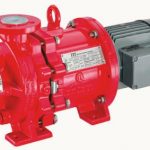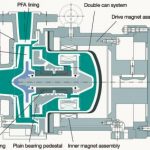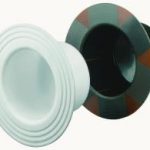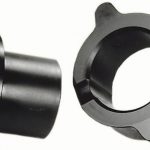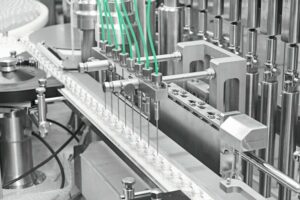Extremely high demands are placed on the purity of the media used in many chemical processes. In addition to high operational reliability, one of the most important criteria in the selection of the plant components to be used is the prevention of contamination of what are frequently very valuable substances.
Dr. F. Bahm
Plastic-lined centrifugal pumps have proved their worth for critical fluids in almost all sectors of chemical engineering over the last 30 years. The hermetically tight magnetic drive designs are nowadays one of the top choices when the aim is to safely convey aggressive, hazardous and often valuable media in large volumes. Another field of application involves media in the fine chemical industry, biotechnology, the pharmaceutical industry and semiconductor production where particularly high demands are placed on their purity. In addition to high operational reliability, one of the most important criteria in the selection of the plant components to be used is the prevention of contamination of the feedstock substances.
In order to convey fluids which come into contact with digital microprocessors and memory elements during the manufacture of these components, for example, only metal-free diaphragm pumps made of very pure plastics are usually considered. Plastic-lined magnetic drive pumps are a convincing solution in terms of technology and economics whenever the limits of these diaphragm pumps are reached or exceeded, for instance owing to flow rates of more than 6 m³/h, high temperatures and/or high pressures, and when simultaneously aiming for a long service life and high operational reliability. Taking the example of hydroxylamine production, the following report describes experience with the conveyance of semiconductor chemicals using plastic-lined centrifugal pumps.
Demands on production
Even impurities in extremely small concentrations (in the ppb range) may cause huge production losses in plants for special chemicals, e. g. in the semiconductor industry. For example, single metal ions can destroy the highly complicated and extremely miniaturised circuits on wafers in the further course of production and thus make entire batches unusable. In the semiconductor industry purity generally means that very stringent action has to be taken to keep the presence of cations/anions, particles and organic residues (hydrocarbon compounds) at the lowest possible level. If the particles present in the process media exceed a critical size, they may result in defective circuits, e. g. in short-circuiting owing to the bridging of conductors. The distance between two adjacent conductors, the so-called feature size, which also determines the degree of miniaturisation of semiconductor circuits, serves as a yardstick for the manufacturing technology and also governs the physical purity of the process media that are used.
The table (see below) contains an overview of the quality classes frequently employed in the semiconductor industry to describe the chemical purity of process chemicals and the relevant admissible maximum values for metal ion concentrations. Predictions of technological developments in the field of memory elements and microprocessors indicate that increasing miniaturisation of circuits can also be expected in the near future. This will result in even higher demands being placed on the purity of the process chemicals and the materials which come into contact with them.
The medium: hydroxylamine-free base
Hydroxylamine (NH2-OH) is a colourless hygroscopic compound which is readily soluble in water and ethanol, is only fluid at ambient pressure between 33 °C and 56 °C and in pure (isolated) form tends towards explosive decomposition. Only 50 % aqueous solutions (hydroxylamine-free base, in short HAFB) are suitable for safe and economical production and handling of hydroxylamine.
However, even hydroxylamine dissolved in water requires special and proper handling. When heated, HAFB may decompose violently, and on complete evaporation a 2000-fold increase in volume may occur. The volume can increase a further 250-fold below boiling point (114 °C).
Spontaneous decomposition of HAFB can occur due to:
- Contamination with metal ions, especially of iron, copper, chrome, nickel and their alloys
- Dust
- The addition of basic or oxidising substances
- Temperatures over 75 °C
- High hydroxylamine concentrations such as those which occur during evaporation, for example
HAFB is used in many sectors of the semiconductor, chemical and pharmaceutical industries: it is regarded as an ideal solvent in chip production for removing organic and inorganic impurities from the wafers. It is an important feedstock for dyes and rust inhibitors and for the production of painkillers, antibiotics, tranquillisers, etc.
As one of the leading producers of process chemicals (inorganic acids and solvents) and gases for the semiconductor industry and LCDs, BASF has at its Ludwigshafen/Germany site the world’s only plant for producing hydroxylamine-free base in USLI quality (concentration of metal ions <10 ppb), with a current capacity of approximately 7,600 t/a.
Selection of the optimum centrifugal pump
In view of the risk of explosive decomposition and the potential health hazard (suspected carcinogenic effect) emanating from the production of HAFB, numerous studies were conducted with regard to the operational reliability of pumps during the planning, construction and later expansion of the production plant in Ludwigshafen. A hermetically tight design to avoid all risks to health and the environment was mandatory as well as the use of suitable monitoring facilities to guarantee trouble-free, continuous operation. Strict requirements additionally had to be satisfied in relation to the purity of the materials used – which crucially influences product quality – and to the avoidance of potential sources of contamination, e.g. through wear on, or possibly failure of, the pump.
Encouraged by the experience gained with these pumps in many BASF plants, those responsible for the HAFB pilot plant decided in favour of magnetic drive centrifugal pumps with an MNK-type PFA lining. Apart from the optimum material combination and the high flow rates, it was above all the high operational reliability and the service life of this make that were the decisive criteria for its choice. What’s more, other centrifugal pumps which were specially intended for this application had previously failed repeatedly within the space of a few weeks.
MNK for ultra-pure media
One major advantage of centrifugal pumps is their hydrodynamic working principle. In contrast to diaphragm pumps which work according to the displacement principle, the energy in centrifugal pumps is converted by altering the flow rate in the vane-type impeller; as a result, the medium is conveyed continuously and evenly, i. e. without pulsations. The facilities required when oscillating machinery is used to suppress periodic pressure fluctuations, which may reduce the effectiveness of the filter systems installed in the plants, are dispensed with here.
The main feature of magnetic drive centrifugal pumps is their hermetic design. The contactless transmission of the drive power renders dynamic seals superfluous, so that leak-free operation is guaranteed and the risk of contamination from outside is excluded. Among the other relevant features of the MNK pump used in the HAFB plant are the fact that the housing shell bears the system pressure and absorbs the pipe forces. The lining provided for all wetted components made of PFA (perfluoroalkoxy copolymer) with a minimum thickness of 3 mm ensures universal chemical resistance of the pump up to a medium temperature of 180 °C.
Only pure PFA (free from stabilising fillers) is used as lining material. Continuously reliable quality control and the purity of the wetted components can therefore be guaranteed.
Even with the double-can system there is a distinct functional separation through the combination of a pressure-bearing can made of carbon-fibre reinforced material (CFR) and a wetted PTFE can insert. No additional heat is produced by current eddy losses owing to the metal-free design. In contrast to metallic pumps, therefore, no heat is generated in the can and transferred to the medium. The bearings of the rotating unit are robustly dimensioned plain bearings made of pure SiC. Thanks to the use of Safeglide-Plus technology, these plain bearings have optimum protection against damage from dry running.
The MNK-B 25–25–160 close-coupled pump used in the HAFB plant was manufactured – just like the valves – in accordance with the quality instructions which are explicitly laid down for ultra-pure applications and aimed at safeguarding the following aspects:
- Processing of the material qualities specified by the customer (in this case: only virgin PFA and pure SiC)
- PFA processing with special tools made of suitable materials
- Segregated storage and handling of all wetted components
- Cleaning of all wetted components
- Assembly in a controlled, dust-free environment separate from the production line
- Use of protective clothing in the assembly, control and packaging departments
- Transport protection to prevent contamination
Operational experience
Since the commissioning of the pilot plant in 1997 and the start of industrial-scale production in 1999, the MNK pump has conveyed optimum quality hydroxylamine without a single failure.
Other installations at BASF involved in the production of ultra-pure sulphuric acid (96 %) for the microelectronics industry, where the stringent SLSI quality is guaranteed, bear witness to the reliability of this design – even under the extreme conditions described above.
cav 400
Share:



